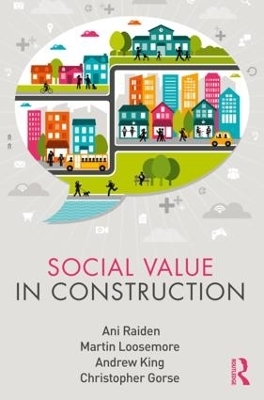
Social Value in Construction
Routledge (Verlag)
978-1-138-29510-0 (ISBN)
While the concept of social value is not new, recent interest in social value in construction has grown because of new social procurement legislation around the world and an increasing acceptance of the need to ensure construction projects provide social value, rather than simply economic value. Despite this growing recognition, literature and professional guidance on the subject is hard to find. This is the first book looking at social value in construction and it sets the agenda by asking and answering important questions like:
How is the construction industry developing and supporting social enterprise and social value and for who?
How and when is the industry recording and measuring social value and its effect?
Which organisations are doing things well and what can we learn from their experiences?
What can industry players do together to consolidate efforts and drive improvements?
What are the key challenges in the field and what does the future look like?
Drawing on a variety of professional and academic experiences and disciplines, the authors present global perspectives and lay the foundations for creating social value in the construction industry. This timely book makes use of real-life case studies and examples of best practice to demonstrate how innovative companies can utilise contemporary research to create social value through their projects. It is time the construction industry viewed community involvement and corporate social responsibility as an opportunity rather than a risk, and this is the book that shows the industry how. This is essential reading for all professionals in the construction, engineering, architecture and built environment sector. In particular, project managers, clients, contract managers, quantity surveyors, CSR and HR personnel will gain a lot from reading this book.
Ani Raiden is Senior Lecturer in Human Resource Management at Nottingham Business School, Nottingham Trent University, UK. She is the Immediate Past Chair of the Association of Researchers in Construction Management, Fellow of the Higher Education Academy, and Chartered Member of the Chartered Institute of Personnel and Development. Martin Loosemore is Professor of Construction Management at the University of New South Wales, Sydney, Australia. He is a Fellow of the Chartered Institute of Building and has published many books and articles in the areas of social enterprise and procurement, innovation, risk management, corporate social responsibility and corporate strategy. Andrew King runs Soul Value, a global built environment think tank and consultancy. He draws on his background as an academic, senior-level industry practitioner, and his work in the field of honest and authentic communication to help clients innovatively maximise social value on their projects. www.soulvalue.co.uk Chris Gorse is Professor of Construction and Project Management, the Director of the Leeds Sustainability Institute, and Head of the Centre for the Built Environment at Leeds Beckett University, UK.
Contents
List of Tables *
Table of figures *
Preface *
About the authors *
Acknowledgements *
Part 1 – Principles and conceptual foundations *
Chapter 1 – Introduction *
Social value in context *
The language of social value *
The economics of social value *
Social procurement and social value *
The political context of social value *
The opportunity for industry leadership in social value *
Defining the social value proposition of in a construction project *
Creating social value through the construction project life-cycle *
The ethics of social value and what it means for measuring social value *
Barriers to delivering social value *
Chapter 2 - Social value in the built environment: the legal framework in the UK – Beulah Allaway and Martin Brown, Anthony Collins Solicitors LLP *
The legal framework for social value creation *
Understanding social value – opportunities in the built environment *
Understanding social value – the legal framework *
Domestic legislation *
Procurement regime and reform in Scotland *
EU legislation *
EU case law *
Understanding when social value is linked to the subject matter of the contract *
Applying social value in practice *
The need for a social value policy *
Preliminary Market Engagement *
Social value at pre-procurement stage *
Social value during the procurement process *
Social value during the contract term *
Social value post contract *
Chapter 3 – Theoretical justification for social value – Andrew Knight *
Some conceptual distinctions between moral and non-moral reasons *
Utilitarianism *
Kantian Ethics *
Decisions between alternatives *
Some existential conclusions *
Chapter 4 – Creating social value within and between organisations *
Partnerships and hybrid collaborations *
Social enterprises and social businesses – with Anna Mimms, MBE *
Employment and employability *
Diversifying the construction workforce to create social value *
Pay and benefits *
Training *
Apprenticeships *
Managing aspirations *
Embedding social value in strategy and practice *
Chapter 5 - Social value assessment *
The case for social value assessment *
Measuring social value in practice *
The social value assessment process *
Step 1 - Planning and program development *
Step 2 - Developing a ‘Theory of Change’ *
Step 3 - Developing a measurement framework *
Step 4 – Implementing the program and assessing and monitoring social impact *
Step 5 – Reporting to stakeholders, learning and improving *
Part 2 - Case studies: Showcase of good practice *
Chapter 6 - Building social value into design and placemaking - Sophia de Sousa, The Glass-House Community Led Design *
People and place *
Empowering design practices at The Glass-House Community Led Design *
Participatory Design *
Design as a vehicle for social value in placemaking *
White City Green *
Tidworth Mums: a case for soft play *
Granville New Homes *
Placemaking and Media skills exchange *
Invest in and learn from collaboration and experimentation *
Chapter 7 – Meadowhall, Sheffield, UK: Co-creating social value on a large private sector project *
The Project *
The Organisations *
The Case Study Participants *
Key Themes *
Values & Priorities *
Employment and Training *
Section 106 Agreements *
Tendering, Monitoring and Measuring *
Chapter 8 – Multiplex’s Connectivity Centres© – an exemplar of social value in action in Australia – Dave Higgon and Joanne Osborne *
What is a Connectivity Centre? *
Context *
Program philosophy *
Benefits *
Measuring the social impact of Multiplex’s Connectivity Centres© *
Social impacts *
Chapter 9 – Latch, Canopy, and CITU, Leeds, UK: Three unique SMEs providing secure housing *
Latch *
Canopy: a Community Housing Project *
CITU: eco-developers with a strong focus on social integration *
Chapter 10 – Deconstructing social value in decommissioning: Industrial heritage at Dounreay, UK – Cara Mulholland, Paul W Chan and Kate Canning *
Dounreay: From ushering a brave new world of energy security to securitising the site *
The Fast Breeder Reactor Programme and UK energy security *
Securitising the site: Making sense of uncertainty and change *
Finding a focus: Dawn of the decade of planning through socio-economic strategies *
A nuclear vision for the North of Scotland *
Creating cultural heritage and legacy in a period of decline *
Social value as an organic or a planned process? *
Nuclear legacy as industrial heritage *
Chapter 11 – Conclusion *
References *
Index *
| Erscheinungsdatum | 13.12.2018 |
|---|---|
| Reihe/Serie | Social Value in the Built Environment |
| Zusatzinfo | 2 Tables, black and white |
| Verlagsort | London |
| Sprache | englisch |
| Maße | 156 x 234 mm |
| Gewicht | 362 g |
| Themenwelt | Sozialwissenschaften |
| Technik ► Bauwesen | |
| Wirtschaft ► Betriebswirtschaft / Management ► Marketing / Vertrieb | |
| Wirtschaft ► Betriebswirtschaft / Management ► Personalwesen | |
| ISBN-10 | 1-138-29510-8 / 1138295108 |
| ISBN-13 | 978-1-138-29510-0 / 9781138295100 |
| Zustand | Neuware |
| Informationen gemäß Produktsicherheitsverordnung (GPSR) | |
| Haben Sie eine Frage zum Produkt? |
aus dem Bereich


